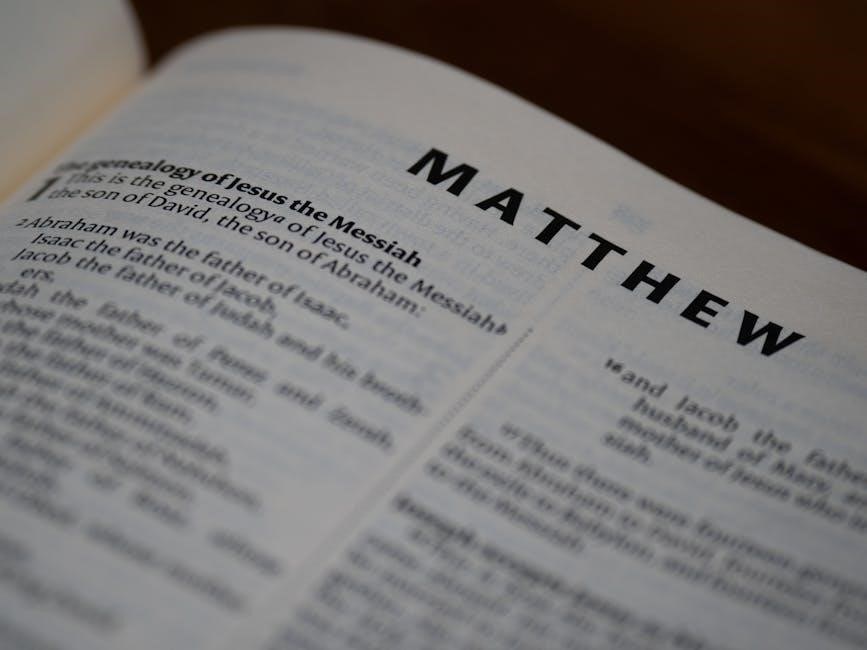A Catholic Bible study workbook is a vital tool for deepening faith and understanding Scripture․ It provides structured guidance, prayer prompts, and reflection exercises, fostering spiritual growth and community engagement․
1․1 Importance of Bible Study in Catholic Faith
Bible study is central to the Catholic faith, fostering a deeper connection with God’s Word and the Church’s teachings․ It enriches spiritual growth, strengthens community bonds, and provides guidance for living a faith-filled life․ Through workbooks and resources, Catholics can engage with Scripture, explore its relevance, and apply its teachings to daily life, nurturing a lifelong commitment to faith and service․
1․2 Purpose of a Workbook in Bible Study
A Catholic Bible study workbook serves as a comprehensive guide, offering structured lessons, reflection prompts, and resources to deepen understanding of Scripture․ It provides background information, study questions, and practical applications, helping individuals and groups engage with the Bible effectively․ Workbooks also include prayer exercises, fostering spiritual growth and encouraging participants to apply biblical teachings to their daily lives, making faith more tangible and relevant․
Key Features of a Catholic Bible Study Workbook
A Catholic Bible study workbook includes structured guides, prayer prompts, reflection exercises, and background information․ It offers study questions, discussion topics, and accessible formats like PDFs for easy access․
2․1 Structure and Layout
Catholic Bible study workbooks are designed with a clear, logical structure․ They often include sections like overviews of biblical books, study questions, and reflection exercises․ The layout typically features easy-to-follow formats, with headings, subheadings, and bullet points for readability․ Many workbooks also incorporate prayer prompts and space for personal notes, enhancing the interactive learning experience․ This organized approach helps usersnavigate Scripture systematically and deepen their understanding effectively․
2․2 Content and Resources
Catholic Bible study workbooks are rich in diverse content, offering detailed commentary, theological insights, and historical context․ They include study questions, reflection exercises, and prayer prompts to enhance engagement․ Many workbooks also provide additional resources such as maps, timelines, and references to Church teachings․ These elements collectively create a comprehensive learning experience, enabling users to gain a deeper understanding of Scripture and its relevance to their faith journey․

How to Use a Catholic Bible Study Workbook
Set goals, follow guided lessons, and engage in reflection․ Use prayer and discussion to deepen understanding․ Regular use fosters spiritual growth and communal learning․
3․1 Step-by-Step Guide
Start with prayer to open your heart․ Read the assigned Bible passage carefully․ Answer workbook questions thoughtfully, reflecting on the text․ Engage in group discussions or personal reflection․ Apply teachings to daily life․ Review and pray, seeking the Holy Spirit’s guidance․ Consistency and intentionality deepen understanding and spiritual growth․
3․2 Tips for Effective Study
Set a consistent schedule to create a routine․ Choose a quiet, distraction-free space for focused learning․ Use commentary from Catholic scholars for deeper insights․ Take notes and review them regularly․ Encourage group participation and shared insights․ Pray before and after study to seek the Holy Spirit’s guidance․ Reflect on how teachings apply to daily life․ These practices enhance understanding and foster spiritual growth․

Benefits of Using a Catholic Bible Study Workbook
A Catholic Bible study workbook enhances spiritual growth, deepens faith understanding, and fosters community connections, providing structured guidance for meaningful reflection and practical application of biblical teachings․
4․1 Spiritual Growth and Development
A Catholic Bible study workbook nurtures faith by providing structured reflection and prayer, helping deepen understanding of Scripture․ It encourages personal connection with God, fostering a stronger spiritual life․ Through guided exercises, it aids in applying biblical teachings to daily life, promoting growth in virtue and discipleship․ Regular use strengthens prayer life and communal worship experiences, enriching overall spiritual development and intimacy with God․
4․2 Building a Stronger Catholic Community
A Catholic Bible study workbook fosters unity and shared faith among participants․ Group studies encourage collaborative learning, where members support one another in understanding Scripture․ Shared insights and discussions strengthen bonds, creating a sense of belonging․ By engaging in communal reflection and prayer, the workbook helps build a vibrant, faith-centered community, enriching parish life and fostering spiritual solidarity among Catholics․
Popular Catholic Bible Study Workbooks
Popular Catholic Bible study workbooks provide structured guidance for exploring Scripture․ They often include in-depth analysis, reflection questions, and practical application, making them invaluable for both individual and group study․
5․1 The Catholic Bible 365 Challenge
The Catholic Bible 365 Challenge is a popular workbook designed to guide participants through the entire Bible in one year․ It offers daily readings, reflections, and space for personal notes, fostering a deeper understanding of Scripture․ Available as a PDF, it is accessible and convenient for individuals seeking a structured approach to Bible study․ Its comprehensive format supports spiritual growth and daily engagement with God’s Word․
5․2 Ignatius Catholic Study Bible Workbook
The Ignatius Catholic Study Bible Workbook is a comprehensive resource for deepening biblical understanding․ It features detailed commentary, study questions, and reflections, making it ideal for personal or group study․ Available as a PDF, it aligns with Catholic teachings and provides practical tools for applying Scripture to daily life, fostering spiritual growth and a deeper connection to God’s Word․

Incorporating Prayer and Reflection
Prayer and reflection are essential for deepening faith and understanding Scripture․ They strengthen the connection to God’s Word, fostering a meaningful and transformative study experience․
6․1 Techniques for Effective Prayer
Effective prayer in Bible study involves lectio divina, where Scripture is read slowly and meditatively․ Journaling thoughts and feelings helps deepen reflection․ Setting specific intentions before prayer focuses the mind and heart․ Incorporating traditional Catholic prayers, like the Rosary, enhances devotion․ Creating a quiet, distraction-free space fosters a deeper connection with God’s Word, making prayer a powerful tool for spiritual growth and understanding․
6․2 Importance of Reflection in Study
Reflection is a cornerstone of Catholic Bible study, allowing individuals to connect deeply with God’s Word․ It encourages personalizing the message, applying Scripture to real-life situations, and fostering a meaningful relationship with faith․ Reflection helps bridge the gap between study and daily living, enhancing spiritual growth and fostering a deeper understanding of Catholic teachings and traditions․

Role of Community in Bible Study
Community enriches Catholic Bible study by fostering shared insights, mutual support, and collective spiritual growth through collaborative learning and faith-sharing experiences․
7․1 Group Dynamics and Learning
Group dynamics in Catholic Bible study foster collaborative learning, encouraging participants to share perspectives, challenge assumptions, and deepen understanding․ Interactive discussions, guided by workbooks, enhance engagement and accountability, while diverse insights enrich spiritual growth․ This collective approach helps participants apply biblical teachings to daily life, strengthening faith and unity within the community․
7․2 Shared Experiences and Insights
Shared experiences in Catholic Bible study foster a sense of unity and deepen spiritual understanding․ Participants exchange insights, fostering empathy and mutual encouragement․ Personal reflections and collective understanding of scripture create a rich learning environment․ This collaborative approach strengthens faith and helps individuals apply biblical teachings to their lives, fostering a sense of belonging within the Catholic community․

How to Choose the Right Workbook
Selecting the right Catholic Bible study workbook involves assessing personal study goals, ensuring content aligns with Catholic teachings, evaluating format practicality, and considering supplementary resources․ Researching and comparing options helps find a workbook that best supports faith journey and fosters deeper biblical understanding․
8․1 Factors to Consider
When selecting a Catholic Bible study workbook, consider alignment with Catholic doctrine, ease of understanding, and relevance to your spiritual journey․ Ensure the content is comprehensive, with clear explanations and practical exercises․ Compatibility with your study style, whether individual or group-based, is crucial․ Additionally, check for supplementary resources, such as reflection guides or prayer aids, to enhance your study experience and deepen your faith․
8․2 Matching Workbook to Personal Needs
Assess your spiritual goals and reading level to find a workbook that suits you․ Consider if you prefer structured lessons or flexible formats․ Check if the content aligns with your interests, such as specific books of the Bible or thematic studies․ Ensure the workbook includes prayer guides or reflection sections to enhance your personal faith journey and deepen your understanding of Scripture․

Using Digital Resources
Digital Catholic Bible study workbooks offer convenient accessibility, enabling anytime, anywhere learning․ E-readers and apps provide enhanced features like search, bookmarks, and sharing, enriching your spiritual journey․
9․1 Availability of Digital Workbooks
Digital Catholic Bible study workbooks are widely available in PDF format, offering easy access to spiritual resources․ Many official Catholic websites, online bookstores, and faith-based platforms provide downloadable options․ These workbooks often include interactive elements, study guides, and reflection prompts, making them versatile tools for personal or group study․ Their digital format ensures convenience and portability, catering to diverse learning preferences and schedules․
9․2 Accessibility and Convenience
Digital Catholic Bible study workbooks in PDF format offer unparalleled accessibility and convenience․ They can be accessed on various devices, allowing study anytime, anywhere․ Features like search functions, bookmarks, and note-taking enhance usability․ Additionally, digital workbooks eliminate the need for physical storage, making them ideal for travelers or those with limited space․ Their flexibility supports both individual and group study, fostering deeper engagement with Scripture․

Creating Your Own Workbook
Developing a custom Catholic Bible study workbook allows personalization, ensuring content aligns with specific needs and goals․ It encourages deeper engagement and tailored learning experiences․
10․1 Steps to Develop a Custom Workbook
Start by defining your study goals and target audience․ Select specific Bible passages and organize content logically․ Include reflection questions, prayer prompts, and space for notes․ Use digital tools or traditional methods to design the layout․ Review and refine the material for clarity and relevance․ Ensure it aligns with Catholic teachings and supports spiritual growth․ This personalized approach enhances engagement and understanding․
10․2 Tools and Resources Needed
To create a custom workbook, you’ll need a computer with word processing software like Microsoft Word or Google Docs․ Design tools like Canva or Adobe Acrobat can enhance layout and visuals․ Access to Catholic Bible translations (e․g․, RSV, NAB) and commentaries is essential․ Include prayer resources, catechisms, and charts for better understanding․ Consult priests or theologians for accuracy and incorporate inspirational images or icons for engagement․ Ensure compatibility with PDF formatting for easy sharing and printing․

Overcoming Common Challenges
Overcoming common challenges in Catholic Bible study involves addressing time management and understanding complex scripture․ Creating a structured schedule and utilizing study aids can enhance comprehension and consistency․ Prayer and community support also play crucial roles in maintaining motivation and overcoming difficulties․
11․1 Maintaining Consistency in Study
Maintaining consistency in Catholic Bible study requires discipline and intentionality․ Setting aside a specific time daily for study helps build a routine․ Using a structured workbook ensures steady progress․ Accountability, through group participation or a study partner, reinforces commitment․ Reflecting on each session and praying for guidance fosters persistence․ Celebrating small milestones also keeps motivation high, ensuring long-term consistency in study habits․
11․2 Understanding Complex Scripture
Understanding complex Scripture in a Catholic Bible study workbook involves breaking down difficult passages․ Using study guides, footnotes, and commentary helps clarify meanings․ Historical context and theological insights provide deeper understanding․ Praying for the Holy Spirit’s guidance enhances comprehension․ Discussing challenging verses with others fosters collective learning and shared perspectives, ensuring Scripture is interpreted faithfully and accurately within the Catholic tradition․
Applying Bible Teachings in Daily Life
Integrate faith into daily decisions by applying biblical principles to personal and professional life․ Use virtues like kindness and honesty, guided by Church teachings and prayer․
12․1 Practical Application Techniques
Practical techniques include integrating Bible teachings into daily routines, such as reflecting on scripture during meals or setting faith-based goals․ Apply virtues like forgiveness and charity in relationships․ Use prayer to align actions with God’s will and share faith through acts of kindness․ Create a personal action plan based on biblical lessons to guide decisions and behaviors, fostering a deeper connection between faith and daily life․
12․2 Real-Life Examples of Application
Examples include resolving conflicts using Christ’s teachings on forgiveness, serving the needy inspired by the Good Samaritan, or making decisions guided by Proverbs’ wisdom․ Applying biblical values in parenting, such as teaching humility and kindness, or using scripture to overcome anxiety through prayer and trust in God’s plan․ These real-life applications demonstrate how faith can transform everyday situations and relationships․
The Role of the Holy Spirit
The Holy Spirit illuminates scripture, inspiring reflection and guiding Catholics to deepen their faith․ It empowers believers to apply biblical truths, fostering a personal connection with God’s Word․
13․1 Guidance in Bible Study
The Holy Spirit provides divine guidance, illuminating scripture and offering insights that deepen understanding․ It enables believers to interpret complex passages and apply biblical truths to their lives․ Through the Spirit’s wisdom, Catholics find strength and clarity, fostering a meaningful connection with God’s Word․
13․2 Inspiration for Deeper Understanding
The Holy Spirit inspires Catholics to delve deeper into scripture, awakening faith and illuminating God’s message․ Through prayer and reflection, the Spirit transforms lives, fostering a profound grasp of biblical truths․ This divine inspiration nurtures spiritual growth, guiding believers to apply scripture in daily life and fostering a deeper connection with God’s Word for a richer, more meaningful faith journey․
A Catholic Bible study workbook enriches faith, deepens understanding, and fosters spiritual growth․ Regular study, reflection, and community engagement empower believers to live according to God’s Word․
14․1 Summary of Key Points
A Catholic Bible study workbook offers structured guidance for deeper faith understanding, fostering spiritual growth through reflection, prayer, and community engagement․ It provides practical tools for applying biblical teachings, helping individuals and groups to grow in their relationship with God․ Regular use promotes consistency, while digital formats like PDFs enhance accessibility, making it easier to integrate Bible study into daily life and community practices․
14․2 Encouragement for Continued Study
Embrace the journey of faith by consistently engaging with your Catholic Bible study workbook․ Each page brings you closer to God, fostering spiritual growth and a deeper understanding of His word․ Stay committed, celebrate progress, and allow the Holy Spirit to guide you․ Share insights with others and let scripture inspire your daily life, transforming faith into action with joy and purpose․

Additional Resources
Explore recommended books, online forums, and Bible study apps for deeper understanding․ Utilize PDF guides and seek guidance from priests or study groups for enhanced learning․
15․1 Recommended Reading Materials
․ These resources provide theological insights and historical context, complementing your workbook․ Additionally, explore devotional books like The Bible in a Year for daily reflections․ Utilize PDF guides from reputable publishers like Ignatius Press or Our Sunday Visitor for deeper understanding and practical application of biblical teachings․
15․2 Online Communities and Forums
Engage with online Catholic communities like Catholic Answers, EWTN, or Discerning Hearts․ These forums offer discussion boards, study groups, and downloadable PDF resources․ Participate in live webinars and access video tutorials for deeper insights․ Such platforms foster connection, accountability, and shared learning, helping you stay motivated and inspired in your Bible study journey․


